KI for the BioCentury is a leading interdisciplinary research institute in biological science, biomedical engineering, and biotechnology working in a strong collaborative environment with world leading research institutes and global corporations.
In efforts to address issues related to human health, sustainable chemicals and energy, and protection of the environment, research at KIB focuses on Innovative Drug Screening and Development Platforms, Neurodegenerative and Mental Disorders, Systems and Synthetic Biotechnology, and Development of Bio/Medical Instruments.
The core group of KI for the BioCentury consists of seven research labs led by Prof. Sun Chang Kim, Prof. Byung-Kwan Cho, Prof. Ji-Joon Song, Prof. Byung-Ha Oh, Prof. Sangyong Jon, Prof. Won Do Heo, and Prof. Jin Hee Han.
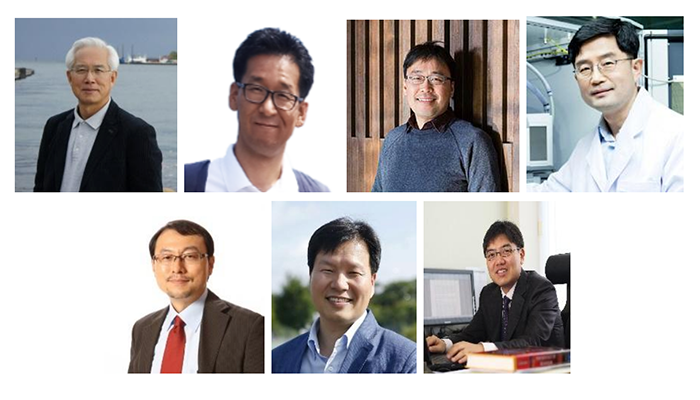
Human Microbiome Control
GPEL (Genome and Peptide Engineering Lab) (Prof. Sun Chang Kim)
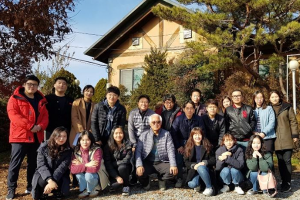 The Genome and Peptide Engineering Lab focuses on two major subjects, development of intelligent bio-systems for synthesis of natural products, and peptide engineering for application to bio materials. Based on synthetic biology, our lab aims to construct bio-synthetic pathways in microorganisms to produce natural products that are known to have various biological activities. We also synthetize peptides that have anti-microbial activity and apply them as bio-materials through mass production. Our final goal is to create innovative synthetic pathways, produce highly valuable products for improvement of general human health, and contribute to sustainable human welfare on the basis of bio-technology.
The Genome and Peptide Engineering Lab focuses on two major subjects, development of intelligent bio-systems for synthesis of natural products, and peptide engineering for application to bio materials. Based on synthetic biology, our lab aims to construct bio-synthetic pathways in microorganisms to produce natural products that are known to have various biological activities. We also synthetize peptides that have anti-microbial activity and apply them as bio-materials through mass production. Our final goal is to create innovative synthetic pathways, produce highly valuable products for improvement of general human health, and contribute to sustainable human welfare on the basis of bio-technology.
SSBL (Systems & Synthetic Biology Lab) (Prof. Byung-Kwan Cho)
 The Systems and Synthetic Biology Lab focuses on interdisciplinary research encompassing topics from engineering problems in the production of value-added biomaterials to fundamental scientific problems in biology. Specifically, the SSBL is highly interested in the research areas of microbial systems and synthetic biology. The SSBL pursues a systems approach to decoding microbial genomes and utilizes information-rich data types for synthetic biology applications. It is intensively based on the growing availability of high-resolution omics data types and diverse synthetic biology tools.
The Systems and Synthetic Biology Lab focuses on interdisciplinary research encompassing topics from engineering problems in the production of value-added biomaterials to fundamental scientific problems in biology. Specifically, the SSBL is highly interested in the research areas of microbial systems and synthetic biology. The SSBL pursues a systems approach to decoding microbial genomes and utilizes information-rich data types for synthetic biology applications. It is intensively based on the growing availability of high-resolution omics data types and diverse synthetic biology tools.
Cancer Metastasis Control
Structural Biology of Epigenetics Lab (Prof. Ji-Joon Song)
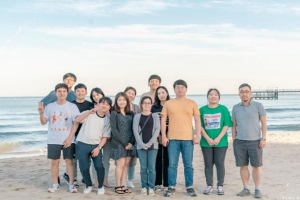 The Structural Biology of Epigenetics Lab is applying a hybrid method of X-ray crystallography and cryo-Electron Microscopy to reveal 3 dimensional structures of supra-molecular complexes involved in epigenetic modification. We aim to determine whole structures of complexes by EM and to fit atomic resolution structures of subunits determined by X-ray crystallography on EM maps to obtain complete pictures of the complexes.
The Structural Biology of Epigenetics Lab is applying a hybrid method of X-ray crystallography and cryo-Electron Microscopy to reveal 3 dimensional structures of supra-molecular complexes involved in epigenetic modification. We aim to determine whole structures of complexes by EM and to fit atomic resolution structures of subunits determined by X-ray crystallography on EM maps to obtain complete pictures of the complexes.
TPD/SB Lab (Therapeutic Protein Design & Structural Biology Laboratory) (Prof. Byung-Ha Oh)
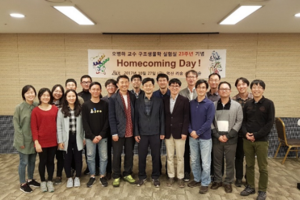 The Therapeutic Protein Design & Structural Biology Lab started computational protein design using the program suite ROSETTA. By creating proteins that do not exist in nature, unmet biomedical or biotechnological needs can be met. Computational protein design is possible owing to the enormous increase in computing power, the robust modeling software ROSETTA, and drastically reduced cost of DNA synthesis. We focus on the design of therapeutic proteins with two major aims: one is to provide an innovative platform for therapeutic antibody application; the other is to create artificial proteins that can block sepsis for which no therapeutic agent is currently unavailable.
The Therapeutic Protein Design & Structural Biology Lab started computational protein design using the program suite ROSETTA. By creating proteins that do not exist in nature, unmet biomedical or biotechnological needs can be met. Computational protein design is possible owing to the enormous increase in computing power, the robust modeling software ROSETTA, and drastically reduced cost of DNA synthesis. We focus on the design of therapeutic proteins with two major aims: one is to provide an innovative platform for therapeutic antibody application; the other is to create artificial proteins that can block sepsis for which no therapeutic agent is currently unavailable.
Bio-Nanomedicine Lab (Prof. Sangyong Jon)
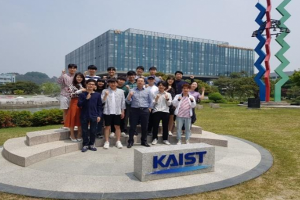 The Bio-Nanomedicine Lab focuses on the development of platform technologies that meet unmet medical needs, particularly in the fields of cancer and inflammation research. The key platforms developed in the JON Lab include i) a smart drug delivery system based on the naturally occurring endogenous compound bilirubin, which has been utilized to treat cancers and inflammatory diseases and ii) a novel cell culture platform that enables generation of highly tumorigenic 3D cancer stem cell spheroids from cell lines and patient-derived primary cancer cells and identification of novel biomarkers associated with metastasis and malignancy.
The Bio-Nanomedicine Lab focuses on the development of platform technologies that meet unmet medical needs, particularly in the fields of cancer and inflammation research. The key platforms developed in the JON Lab include i) a smart drug delivery system based on the naturally occurring endogenous compound bilirubin, which has been utilized to treat cancers and inflammatory diseases and ii) a novel cell culture platform that enables generation of highly tumorigenic 3D cancer stem cell spheroids from cell lines and patient-derived primary cancer cells and identification of novel biomarkers associated with metastasis and malignancy.
Bio-Imaging & Optogenetics Lab (Prof. Won Do Heo)
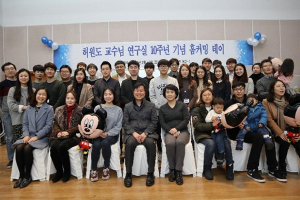 The Bio-Imaging and Optogenetics Lab investigates fundamental cellular processes by using diverse bio-imaging instruments to develop and utilize novel bio-imaging technologies. Recently, the research group exploited next generation optogenetic toolkits on in vivo mouse models to understand mechanisms to control synaptic plasticity and learning and memory.
The Bio-Imaging and Optogenetics Lab investigates fundamental cellular processes by using diverse bio-imaging instruments to develop and utilize novel bio-imaging technologies. Recently, the research group exploited next generation optogenetic toolkits on in vivo mouse models to understand mechanisms to control synaptic plasticity and learning and memory.
Brain Cognitive Function Control
NCBlab (Neural Circuit and Behavior Lab) (Prof. Jin-Hee Han)
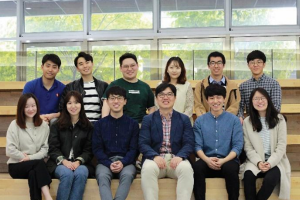 The Neuron Circuit and Behavior lab focuses on 1) understanding the molecular, cellular, and circuit level mechanisms underlying brain functions in normal and diseased cases and 2) developing novel therapeutics to help restore impaired brain cognitive functions.
The Neuron Circuit and Behavior lab focuses on 1) understanding the molecular, cellular, and circuit level mechanisms underlying brain functions in normal and diseased cases and 2) developing novel therapeutics to help restore impaired brain cognitive functions.
Neurodegenerative diseases and mental disorders cause critical impairment in essential brain functions such as learning & memory, emotion, and other cognitive functions. Despite great efforts, the underlying biological mechanisms remain elusive, and there have been no effective treatments.






